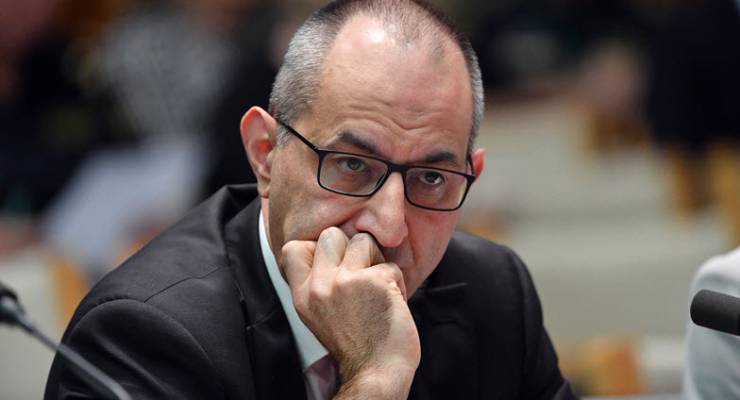
Department of Immigration and Border Protection Secretary Michael Pezzullo
The government’s plan to achieve major savings through merging immigration and customs is in tatters with the Department of Immigration and Border Protection reporting a major budget blowout in its 2016-17 annual report.
The department reported a 7% blowout in costs, or $181 million, blaming higher than forecast border protection and asylum seeker costs as well as a higher wages bill. Against that, the department claimed a lower than expected administered spending outcome of around $90 million. Taking higher than expected revenue into account, the department — which is slated to become the basis of a massive new Home Affairs portfolio — reported a blowout in its 2016 forecast net cost of services of $148 million, leading to the government having to hand the department an extra $100 million over the course of the year. On the bright side, that total net cost was around $58 million lower than 2015-16, which also came in over budget forecast.
Last year’s Immigration annual report required an urgent corrigendum after Crikey exposed a serious problem in its reported loss that the Department blamed on its treatment of depreciation.
When the merger of Immigration and Customs was mooted in 2014, then-Immigration minister Scott Morrison promised it would yield “hundreds of millions in savings” on top of “the fiscal dividend of our stronger border protection policies that are stopping the boats and saving the budget.” The cost of offshore processing under both the Gillard/Rudd and current governments had reached nearly $5 billion earlier this year, with the ANAO revealing massive blowouts in the costs of offshore processing contracts, unauthorised spending and complaints from then-Prime Minister Tony Abbott that the department wasn’t able to reduce costs as he’d demanded.
Last week, the Joint Committee of Public Accounts and Audit, which has been cracking down on departments that fail to implement audit recommendations, lashed Immigration for still failing to adopt proper cybersecurity processes despite repeated adverse audit findings:
“The Committee is concerned to hear from DIBP that it is only in its second year of implementing cybersecurity enhancement programs. The Committee notes that significant machinery of government changes—with the creation of Australian Border Force—contributed to the delay in achieving compliance, however considers that compliance may have been achieved sooner if investment in these programs were made earlier. It is concerning to the Committee that a national strategic organisation, which is expected to operate in most, if not all time zones, on a 24 hour basis cannot, as yet, achieve the minimum requirement towards cyber resilience and has no timeframe in which to do so.”
Despite an extraordinary list of bungles by the department, however, its Secretary, Mike Pezzullo, and Minister, Peter Dutton, appear to face no internal government pressure to bring their department into line.








Crikey is committed to hosting lively discussions. Help us keep the conversation useful, interesting and welcoming. We aim to publish comments quickly in the interest of promoting robust conversation, but we’re a small team and we deploy filters to protect against legal risk. Occasionally your comment may be held up while we review, but we’re working as fast as we can to keep the conversation rolling.
The Crikey comment section is members-only content. Please subscribe to leave a comment.
The Crikey comment section is members-only content. Please login to leave a comment.